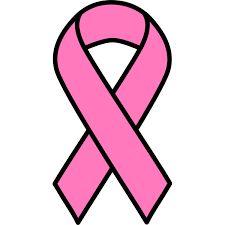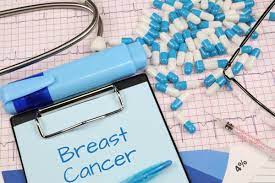Breast Cancer: Separating Fact From Fiction
Breast Cancer is probably the most talked-about form of cancer today. Millions upon millions of dollars are donated from regular people like you into research that will help patients overcome breast cancer and treatments that save lives all over the country.
 Despite all the money spent on Breast Cancer Awareness, many people are still woefully ill-informed about the truths of Breast Cancer. Their knowledge of breast cancer is primarily the result of hearsay and hypotheses put forth in the past becoming outdated. Let's discuss some of these myths now and separate fact from fiction.
Despite all the money spent on Breast Cancer Awareness, many people are still woefully ill-informed about the truths of Breast Cancer. Their knowledge of breast cancer is primarily the result of hearsay and hypotheses put forth in the past becoming outdated. Let's discuss some of these myths now and separate fact from fiction.
Fiction: Breast Cancer is Primarily Hereditary, and women are only at high risk if they have a family history of breast cancer.
Many believe breast cancer is primarily a genetic condition and carries the risk from parents to daughters. In reality, it is believed that only between five and ten percent of breast cancer cases are the result of genetic mutations acquired from the mother or father.
Of course, having one of these mutations can significantly increase your risk of breast cancer. For example, women with particular BRCA mutations are eighty percent likely to experience breast cancer at some point in their lives.
Just because you have a family history doesn't mean that you are definitely going to get cancer, however. For example, having a daughter, sister, or mother with breast cancer doubles the cancer risk. If you have two close family members with the condition, your risk increases by three times compared to average.
Out of all breast cancer cases, only twenty to thirty percent have immediate relatives who have experienced the condition. This means most women do not experience breast cancer due to direct hereditary risk passed down from their relatives.
Truth: Although genetic heritage plays a role, it is not the only factor determining breast cancer risk, and most women who get breast cancer don't express genetic predisposition.
Fiction: If someone in your family has had Breast Cancer, you will inevitably get Breast Cancer yourself.
If someone in your family has experienced Breast Cancer in the past, this is vital information that your physician needs to know. In addition to knowing that you have a history, it's also essential for your physician to know how many women in your family have experienced the condition in the past.
Although Breast Cancer risk increases significantly when your family has a prior history of the condition, this doesn't mean that you will definitely get breast cancer in the future.
There are ways to establish your risk, including genetic testing and counseling. One of the issues with how Breast Cancer risk is evaluated these days is that not enough women get these tests done.
The percentage of women that actually receive this analysis is in the single digits! As with many other conditions, patients simply aren't open enough  with their doctors, and many doctors don't readily recommend such procedures without prompting.
with their doctors, and many doctors don't readily recommend such procedures without prompting.
Suppose your genetic evaluation says that you are at an elevated risk of Breast Cancer. In that case, this can completely change how your physician handles your Breast Cancer Prevention and Monitoring.
For example, women at high risk benefit from earlier screening, both in the form of mammograms and MRI scanning. Breast Cancer, when caught early, has a very high rate of successful treatment, and by catching it early, it can be removed and treated before it has the chance to risk your health significantly. Even preventative treatments available, ranging from surgery to pharmaceuticals, can be used to mitigate your breast cancer risk, depending on your risk level.
Truth: Women with a family history shouldn't think breast cancer is inevitable, but they should take the steps to ensure their health and safety. With proper care and screening, Breast Cancer can usually be prevented or defeated before it reaches its more dangerous stages.
Fiction: Women without a history or genetic disposition toward breast cancer have nothing they can do to mitigate their potential risk for the condition.
Some variables of Breast Cancer risk are incontrovertible. There's nothing you can do about your age or your family history. There's nothing you can do to change when you enter puberty or reach menopause. On the other hand, there are a variety of factors that you do have the power to mitigate, and you can take an active role in your breast cancer prevention. The following are three factors to consider: Activity Level, Body Composition, and Alcohol Consumption.
Activity Level - A sedentary lifestyle has been scientifically shown to increase Breast Cancer risk. Studies have shown that women who get a lot of physical activity daily have a 25% reduced breast cancer risk compared to their largely sedentary counterparts.
The ideal level of cardiovascular exercise to mitigate breast cancer risk is between 45 minutes and an hour per day, although less activity promotes breast health. Ideally, women should undergo vigorous exercises, such as swimming, cycling, or jogging. However, as little as 75 minutes of light cardio per week can reduce the risk of breast cancer by around 18%.
Body fat percentage has been strongly correlated to the risk of breast cancer in women (and men). This is even more true after Menopause. As you experience your regular periods, the ovaries are primarily responsible for Estrogen production, whereas adipose fat tissue produces much less.
After a woman's Ovaries stop producing Estrogen at menopause, however, the body primarily relies on fat cells to produce the hormone. The amount of estrogen a woman produces via her body fat correlates entirely with the amount of body fat she carries. Abnormally high Estrogen Levels increase breast tissue activity, which further correlates to breast cancer risk.
Alcohol Consumption - It is well documented that Alcohol suppresses Testosterone production in men by increasing the rate at which Testosterone is converted into Estrogen. Alcohol consumption also leads to an increase in breast cancer risk as well, as a result of increasing Estrogen levels in the bloodstream.
Specifically, each drink women consume daily is associated with an increased risk of Breast Cancer of between ten and twelve percent. In addition, high levels of Alcohol consumption are also associated with other cancers such as liver, esophagus, throat, and mouth cancer.
For women that drink alcohol, the American Cancer Society suggests no more than one per day. To minimize Breast Cancer risk associated with Alcohol, it's best not to drink at all.
Truth - Lifestyle factors play a significant role in cancer risk, and by improving your lifestyle, you can reduce the odds of experiencing Breast Cancer in the future.
Fiction - Injuring your breast can cause breast cancer.
Many women are under the mistaken notion that hurting one's breast can cause breast cancer. There is no evidence that bruising breast tissue can cause breast cancer. This myth began to circulate because bruising or pain in a particular breast area occasionally brings existing cancers to the patient's or physician's notice. In these cases, the tumor has existed for a while but simply hasn't been noticed.
Truth - You can't get cancer from breast bruises.
Fiction - Breast Cancer is a disease that only occurs in women.
In reality, both sexes can get breast cancer. So many people think men can't get breast cancer because it is far rarer than female breast cancer. Women get breast cancer at a rate that is a hundred times that of their male counterparts. On average, only 2,200 men in the United States get breast cancer, whereas 230,000 women experience the disease. The mortality rates differ similarly: 400 males die each year from the condition, whereas 40,000 women die from breast cancer.
 Men are unaware that male breast cancer can be detrimental to their health. Because they don't understand that men can get breast cancer, they frequently recognize the lumps but simply ignore them until they become impossible to ignore, a point at which the danger of cancer has grown dramatically, and the outlook becomes far grimmer.
Men are unaware that male breast cancer can be detrimental to their health. Because they don't understand that men can get breast cancer, they frequently recognize the lumps but simply ignore them until they become impossible to ignore, a point at which the danger of cancer has grown dramatically, and the outlook becomes far grimmer.
Women have a higher incidence of breast cancer for several vital reasons. First, most cancers respond to progesterone and/or estrogen, feeding off of the hormones to grow. Since men don't produce nearly as much, their risk is significantly lower. Also, men have fewer breast cells than women, meaning that there are fewer possible cells to malfunction.
Truth - Although men experience breast cancer at a much lower rate, they should still see their doctor if they sense any breast tissue abnormalities.
Fiction - The ideal way to catch breast cancer is with monthly self-exams
Not too long ago, it was recommended that women give themselves monthly evaluations to check for breast lumps and other abnormalities, but this is no longer the recommended protocol of the American Cancer Society.
They discovered that these examinations increased the rate of false positives while not being effective at discovering real cancer. Instead, the current suggestion is simply to know one's body and be aware of any abnormal changes. Most women discover Breast Cancer during their regular routine, and an emphasis on awareness during routine appears to provide the best detection results.
Of course, women still interested in performing these monthly exams may do so if they wish. Still, they must learn how to perform the exams with maximum accuracy, as taught by their physician, if they wish to perform the self-exam optimally.
If a woman feels a lump or recognizes any breast abnormalities, it is vital to talk to one's physician as soon as possible. Even if you have recently had a mammogram performed, it's still possible that the exam missed potential cancer.
It's essential to not only engage in self-examination but also to undergo a Mammogram because often, Breast Cancer tumors can be recognized before they are felt. The earlier breast cancer is treated, the more likely it will be safely removed and treated thoroughly.
Truth - There's nothing wrong with monthly breast exams, but regular breast awareness is sufficient to recognize potential breast cancer.
Fiction - Finding lumps is the only indication of Breast Cancer
All women understand that breast cancer can lead to tumors, which are referred to as lumps, but many women are unaware of other symptoms indicative of Breast Cancer that can be recognized other than lumps.
For example, unnatural breast discharge, scaliness and redness of the breast or nipple, pain and extreme sensitivity, dimpling, and irritation can all be signs of Breast Cancer. Some women may even experience an inversion of the nipple.
One rare but hazardous type of breast cancer, known as Inflammatory Breast Cancer, is characterized by swelling, thickened skin, and redness rather than lumps. Never assume that changes in breast health are benign or simply caused by infection. Visit a physician as soon as you can.
Truth - Lumps are the most commonly recognized symptom. Still, different cancers have different symptoms, and you should always take the proper precautions and make an appointment with a medical professional at the first sign of breast trouble.
Fiction - Mammograms Are Barely Worth the Time
Unfortunately, some women have lost faith in mammograms' effectiveness. In reality, mammograms are pretty effective at recognizing breast cancer, with a success rate between 80% and 90%.
No data can accurately reflect how Mammograms mitigate mortality risk, but there is near universal agreement that Mammograms save women's lives regularly. The general consensus is that when women turn forty, they should start getting yearly Mammograms.
Truth - Mammograms are an effective means to monitor for breast cancer.
Fiction - Deodorants Can Cause Breast Cancer
Websites and emails claim that Deodorants and Antiperspirants can cause breast cancer by inhibiting immune function and blocking the lymph nodes. They supposedly increase toxin concentrations in the breast tissue by inhibiting immune function. No evidence suggests this is even a possibility.
One major study surveyed whether women with and without breast cancer used deodorant to see if there was any correlation between using such products and breast cancer. No significant connection was found. Shaving also had no notable impact on the breast cancer rate.
Truth - Antiperspirants have absolutely zero noted connection with Breast Cancer.
- 0001 Six Questions You Should Ask Yourself Before Your Trip To The Doctor [Last Updated On: May 22nd, 2025] [Originally Added On: October 16th, 2020]
- 0002 Requirements For Hormone Replacement Therapy [Last Updated On: January 30th, 2025] [Originally Added On: October 17th, 2020]
- 0003 Hgh Testimonials And Reviews [Last Updated On: January 29th, 2025] [Originally Added On: October 18th, 2020]
- 0004 Clomiphene Citrate Information And Guide [Last Updated On: May 25th, 2025] [Originally Added On: October 19th, 2020]
- 0005 A Brief Guide To Endocrinology [Last Updated On: April 25th, 2025] [Originally Added On: October 21st, 2020]
- 0006 Managing Cardiovascular Risks Associated With Prostate And Breast Cancer [Last Updated On: February 14th, 2025] [Originally Added On: May 5th, 2021]
- 0007 Presence of Specific Genetic Allele Influences Response to Growth Hormone Therapy [Last Updated On: April 3rd, 2025] [Originally Added On: July 15th, 2021]
- 0008 Macimorelin A New Diagnostic Tool for Diagnosing Adult Growth Hormone Deficiency [Last Updated On: March 29th, 2025] [Originally Added On: July 22nd, 2021]
- 0009 Ipamorelin Acetate with CJC 1295 for HGH Deficiency [Last Updated On: February 15th, 2025] [Originally Added On: May 29th, 2022]
- 0010 Why Do My Friends Feel So Good While I Feel So Bad? [Last Updated On: March 10th, 2025] [Originally Added On: June 20th, 2022]
- 0011 My Vacations Weren’t Vacations Anymore [Last Updated On: March 2nd, 2025] [Originally Added On: June 28th, 2022]
- 0012 Racing Ferraris – A Stressful Way to Earn a Living [Last Updated On: March 19th, 2025] [Originally Added On: July 12th, 2022]
- 0013 Symptoms of Growth Hormone Deficiency in Adults [Last Updated On: April 6th, 2025] [Originally Added On: September 15th, 2022]
- 0014 HGH and Intellectual Improvements [Last Updated On: April 20th, 2025] [Originally Added On: March 8th, 2023]
- 0015 Abie’s Lies [Last Updated On: April 12th, 2025] [Originally Added On: March 23rd, 2023]
- 0016 Revolutionizing the Silver Years: Age-management Warriors Defying Time’s Grip [Last Updated On: February 17th, 2025] [Originally Added On: February 14th, 2025]
- 0017 Introduction: A Personal Story [Last Updated On: February 18th, 2025] [Originally Added On: February 18th, 2025]
Word Count: 2004






